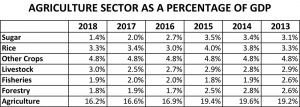I would be the first in line to support any Government that has the vision to grow the Guyanese food production industry. Such a measure will surely create millions of dollars for the people and thousands of new jobs. The biggest beneficiary of such a strategy is the severed sugar workers who number more than 5000 persons. Unfortunately, some three years after this A Partnership for National Unity/Alliance For Change (APNU/AFC) Government won executive power, Guyana is experiencing a material decline in the agriculture sector as a result of their fake promises.
According to the 2017 Bank of Guyana Annual Report, the agriculture sector declined to 16.6 per cent of the economy last year. When compared to the last full year performance under a People’s Progressive Party (PPP) Government in 2014, the agriculture sector contributed some 19.6 per cent of the economy. An economy grows sustainably on bedrock industries like manufacturing, agriculture, construction, and mining. But none of these productive sectors took up the slack from the declining agriculture sector. In fact, it was a retail and wholesale trading that mainly filled the gap. Guyana is now the land of buying what others produce and sell to the world less and less of our homegrown production. That surely will not make Guyana great again, if there was ever such a period.
from the declining agriculture sector. In fact, it was a retail and wholesale trading that mainly filled the gap. Guyana is now the land of buying what others produce and sell to the world less and less of our homegrown production. That surely will not make Guyana great again, if there was ever such a period.
As the table below illustrates, the majority of the sub-sectors in agriculture has declined since the PPP left office. Sugar has declined from 3.4 per cent of the economy in 2014 and is projected to slide to 1.4 per cent in 2018. Rice, the knight in shining armour, which was supposed to have filled the gap as a result of the decline in the sugar belt, experience its own decline. Rice declined from 3.8 per cent of Gross Domestic Product in 2014 to a projection of 3.3 per cent in 2018. Today, Guyana is exporting more paddy and moving down the value chain with regards to rice-related products. There has been a total implosion in the forestry sector as it appears the policymakers cannot make up their mind what they really want to do with this sector.
It was President David Granger who stood on the riverfront on the Berbice River and lectured a small crowd in 2015, on a message that once he is President, there will be less exportation of raw sugar, raw rice, raw timber and raw food in general. But the statistics show that there is a marked decline in the value added agriculture sector. There has been very limited traction on the agro-processing front to leverage greater value for the people of Guyana since President Granger took power in May 2015. The indecisive and “loosy-goosy” agricultural policy under Minister Noel Holder complicated matters and has resulted in Guyana mutating into buying more processed and packaged food in general from overseas while exporting less value-added agriculture products. So much for Granger’s promises.
What is needed is a proper national conversation on how we can double our annual valued-added food exports by the year 2020. But from all appearances, it seems time has run out on the APNU/AFC, People’s National Congress-led Government. The General and Regional Elections are 18 months away and the people with political power have buried their heads under the sand and are satisfied to spread oil propaganda as a short-term strategy to deceive.
What Guyana continues to excel at since Granger came into office is the exportation of people; not food. According to a Guyana Times article dated December 8, 2018, based on an interview with the current Deputy Ambassador of the United States, Terry Gonzalez, the United States has issued over 100,000 visas to Guyanese citizens over the last three years. Included in that number is some 18,000 immigrant visas, meaning Guyanese are leaving permanently to settle in the land of the brave and the free at an average of 6000 people per year. And that is just the United States. Our people are also leaving for Canada, the Caribbean, Europe, and even Brazil as they continue to find greater opportunity in lands where they were not born although Guyana is potentially the richest country in the entire Caribbean Community family.
Nothing has changed since May 2015, actually, the economic hardship for the poor and the working class has gotten even more challenging. The outcome from such hardship means more migration and less production. Is this how you develop a country sustainably?
 from the declining agriculture sector. In fact, it was a retail and wholesale trading that mainly filled the gap. Guyana is now the land of buying what others produce and sell to the world less and less of our homegrown production. That surely will not make Guyana great again, if there was ever such a period.
from the declining agriculture sector. In fact, it was a retail and wholesale trading that mainly filled the gap. Guyana is now the land of buying what others produce and sell to the world less and less of our homegrown production. That surely will not make Guyana great again, if there was ever such a period.